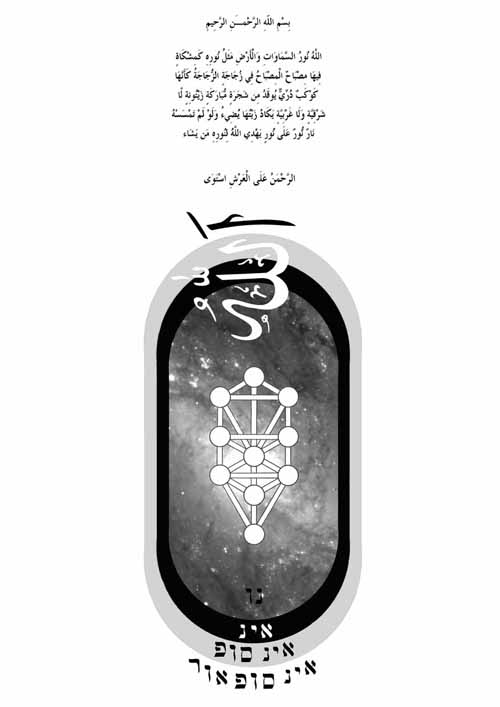Islamic cosmology
From Thelemapedia
The first ayat to be considered in relation to cosmology is ‘Ayat al Kursi’ (2:255), which may be considered one of the most recited verses of the Quran. Although the word ‘Kursi’ is often translated as ‘Throne’ it is considered more correct in its Quranic context to consider it as ‘footstool’
Allah! There is no god but He, The Living, The Self-subsisting, Supporter of all, No slumber can seize Him nor Sleep. His are all the things in the heavens and on earth. Who is thee can intercede in His presence except as He permitteth? He knoweth what (appeareth to his creatures as) before or after or behind them. Nor shall they compass aught of his knowledge except as He willeth. His Footstool doth extend over the heavens and the earth, and he feeleth no fatigue in guarding and preserving them for He is Most High, The Supreme (in glory). (Quran, Surah 2, Ayat 255)
This when considered in light of modern scientific cosmology (Ar Rahaman At Tarjumana, 1980), could signify that the Footstool extends over the heavens. The ‘heavens’, may indeed be taken to mean our own created universe. If the universe exists, as posited by modern scientific paradigm, as spherical, then the Kursi that extends over it must encompass it. ‘Al-Arsh’ or ‘The Throne’ is considered to lie at an unperceivable distance beyond ‘Al-Kursi’, beyond what is referred to as a sea, and just as the Kursi extends over the creation, so does the Arsh extend over Paradise. Despite being unable to verify this cosmology via scientific method, when asked of the relation between the Kursi and the Arsh;
It is confirmed from Abu Dharr that the Prophet said; “The seven heavens are to the Kursi but like a ring thrown in a desert land. And the superiority of the Arsh compared to that of the Kursi is like the superiority of that desert compared to the ring. (Al-Sa‘di, 2003, p.274, note 147)
‘Firdaws’, the highest part of paradise is described thus,
The highest of the degrees of Paradise is al-Firdaws, as it was narrated that Abu Hurayrah (may Allaah be pleased with him) said: The Messenger of Allaah (peace and blessings of Allaah be upon him) said: “… When you ask of Allaah, ask Him for al-Firdaws, for it is in the middle of Paradise and is the highest part of Paradise, and above it is the Throne of the Most Merciful, and from it spring forth the rivers of Paradise.” Narrated by al-Bukhaari, 2637; Muslim, 2831. (The degrees and levels of Paradise and Hell, Web Resource)
The Quran states that Allah, ‘The Most Gracious is firmly established on the throne.’ (Quran, Sura 20, Ayat 5), and Islamic scholarly edict makes plane the separation between Allah and his creation with Imam `Abd al-Ghani al-Nabulusi renowned statement ‘Whoever believes that Allah permeates the Heavens and the Earth, or that He is a body sitting on His Throne, is a disbeliever, even if he thinks he is a Muslim.’ (Kabbani, 1996, p.86).
The image to the right attempts to synthesise knowledge from the Ibrahimic tradition, using the Tree_of_Life, the Arabic above the image is the Ayat An Nur (24:35), made famous by the 11th Century (Common Era) scholar Imam Abu_Hamid_al_Ghazali in his treatise on the Quranic ayat (verse/sign), Mishkat al-anwar - The Niche of Lights
Allah is the Light of the heavens and the earth. The parable of His light is, as it were, that of a niche containing a lamp; the lamp is [enclosed] in glass, the glass [shining] like a radiant star: [a lamp] lit from a blessed tree - an olive-tree that is neither of the east nor of the west the oil whereof [is so bright that it] would well-nigh give light [of itself] even though fire had not touched it: light upon light! Allah guides unto His light him that wills [to be guided]; and [to this end] Allah propounds parables unto men, since Allah [alone] has full knowledge of all things. (Quran, Surah 24, Ayat 35)
Crowley himself, despite his penchant for intellectual slight of hand, cites an ayat of the Quran thought to be equal to one third of the Quran. It is known as 'The Purity (sincerity) of Faith' and is cited in the introduction to Konx Om Pax, thus one might sign off merely by citing 'Light in Extension' pertaining to the limits of our own minds, and not Al Nur beyond the creation.
SAY: "He is the One God: God the Eternal, the Uncaused Cause of All Being. He begets not, and neither is He begotten, and there is nothing that could be compared with Him. (Quran, Surah 112)
References
Al-Sa‘di, A. A., 2003, An explanation of muhammad ibn ‘abd al-wahhab’s Kitab al-tawhid, Al-Hidayat Publishing, Birmingham, U.K..
Ar Rahaman At Tarjumana, A., 1980, The subatomic world in the quran, Diwan Press, Norwich, UK.
Kabbani, M. H., 1996, Islamic beliefs and doctrine according to ahl as-sunna: a repudiation of "salafi" innovations, ASFA, Kazi Publications, Chicago, IL, USA.
The Holy Quran, 1992 (1413 H), English Translation of ‘The meanings and commentary’, The Custodian of The Two Holy Mosques King Fahd Complex for the Printing of The Holy Quran, P.O. Box 3561, Al-Madinah Al-Munawarah, K, of S.A..
The degrees and levels of Paradise and Hell (http://www.islam-qa.com/index.php?ln=eng&ds=qa&lv=browse&QR=27075&dgn=4)

![[Main Page]](http://www.thelemapedia.org/images/logo.gif)